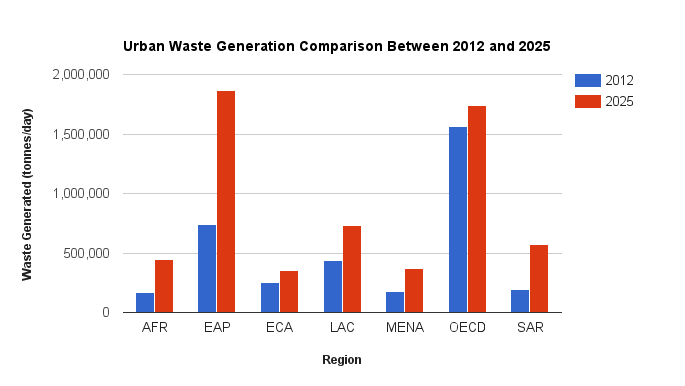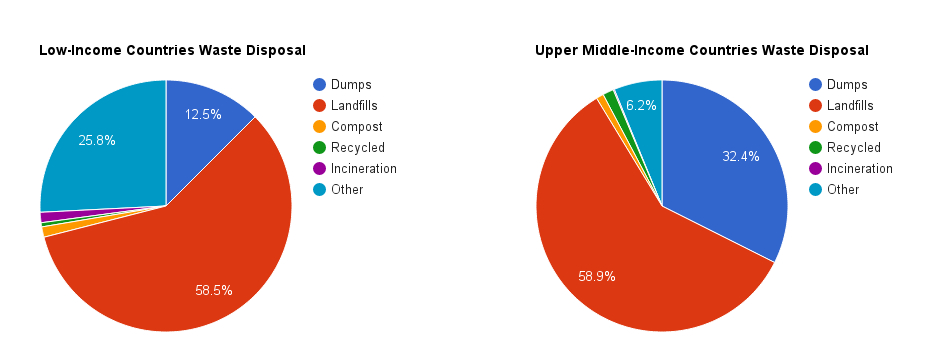Trashmageddon – a Distant Possibility or Today’s Reality?
What is Trashmageddon?

source: Ian Burt ; CC license
Our planet is slowly dying. You don’t have to be a genius to notice the world has serious waste management problems. Nor do you have to be a rubbish removal expert in order to find the evidence for it. There’s plenty of waste statistics making a case so convincing, even the biggest of sceptics have to agree that there is something terribly wrong taking place right now. Movies are also forecasting it (and some of the ideas seem to be quite possible). But statistics and Hollywood predictions alone are not enough to convince people to stop accumulating so much household waste, to recycle more, and to be more responsible with their rubbish footprint. If we don’t take any measures right now, Trashmageddon is not only going to be a plausible scenario, it’s going to be a probable one.
Trashmageddon is a concept we’ve been working on for a while here, at Rubbish Please. As a rubbish removal company, we have a first-hand experience in dealing with certain problems related to waste disposal and we’ve noticed that the refuse levels seem to be increasing every year. Rubbish mountains have begun appearing, tormenting local citizens with pests and toxic fumes. Littering continues to be a growing problem despite the our sincerest efforts to deal with it. People just seem to enjoy living in an environment that closely resembles a landfill.
Given that recycling and reuse are increasing, some people don’t believe there is a cause for concern because of waste. We don’t share this glaring optimism. The aim of this blog post is to raise awareness about the problems we’re facing, but everybody seems to be ignoring. Our company wants to show you why Trashmageddon is possible despite the fact that recycling levels are increasing and rubbish volumes are decreasing. We’re not just blowing off steam. We have enough evidence to support our claim. You will also be convinced by the end of the post.
A Distant Possibility
Many people believe pollution is going to cause big problems in the distant future and waste statistics sure seem to agree on that. The World Bank estimates that rubbish levels will increase twofold by the year 2025, especially from lower-middle income states.
| Region* | Current Available Data (2012) | Projections for 2025 | ||
|---|---|---|---|---|
| Total Urban Population (millions) | Total Urban Waste Generation (tonnes/day) | Total Urban Population (millions) | Total Urban Waste Generation (tonnes/day) | |
| AFR | 260 | 169,119 | 518 | 441,840 |
| EAP | 777 | 738,958 | 1,129 | 1,865,379 |
| ECA | 227 | 254,389 | 239 | 354,810 |
| LAC | 399 | 437,545 | 466 | 728,392 |
| MENA | 162 | 173,545 | 257 | 369,320 |
| OECD | 729 | 1,566,286 | 842 | 1,742,417 |
| SAR | 426 | 192,410 | 734 | 567,545 |
| Total | 2,980 | 3,532,252 | 4,285 | 6,069,703 |
Table shows estimates of waste generation for the year 2025 as expected according to current trends in population growth in each region

*Regions – AFR – Africa, EAP – East Asia and Pacific, ECA – Europe and Central Asia, LAC- Latin America and Caribbean, MENA – Middle East and North Africa, OECD – Organization for Economic Cooperation and Development, SAR – South Africa Region
Countries like India and China are generating industrial quantities of rubbish even today with no stable waste management system in place. This tendency is going to get even worse once their economies develop further. It is projected that by the year 2100, India will generate 70% of the rubbish of all high-income countries put together. All of this translates into huge rubbish piles unless we take proper measures today.
Even if rubbish is purely a future problem, we still need to be more responsible about it. Think about what we’re leaving for the next generation, and the one after that. Think about how we’re raising them. Our children will grow up living in a dump and they’ll think it’s OK, because that’s how it’s supposed to be. Well, it’s not, and they should never believe it is. We should lead them by example.
Given that recycling and waste management technologies are expected to advance significantly, most people aren’t worried that a Trashmageddon might be possible. Some even say that we’ll stop polluting once we reach critical levels, which is like a person saying they will stop eating sugar once they get type II diabetes. That being said, it is estimated that the UK will soon run out of landfills by 2018. Even though recycling has advanced and we’re now reusing and recycling more than ever before, it’s still not enough. More than 50% of the rubbish still goes to landfills and this is about to cause us huge problems in the near future. And it’s not just us – many affluent countries are facing the same problem.

Charts show where our rubbish goes in both poor [left chart] and rich [right chart] countries
Littering is another significant issue, especially considering the inexorable march of the fast food industry. People are just used to littering in the UK, apparently. People are the ones willingly causing a Trashmageddon. The truth is we are far closer to this grim future than we think. In fact, we might even say that this is…
Today’s Reality
In 2012, the UK produced around 200 million tonnes of rubbish (that’s about 50 million less than the USA, so just imagine how much solid waste we have to deal with). From that, 43.9% has been recycled, which sounds like a lot, but it’s really not. With landfill capacity quickly dissipating, imagine what will happen next. We’ll be fined and we’ll have to start exporting our rubbish, which will not make things any better. The fact that even now there are rubbish mountains in London is indicative enough of the issues at hand. With everybody and their mother throwing candy wrappers and fast food leftovers on the ground, it’s just a matter of time before we are all buried in rubbish. Trashmageddon is more or less a reality right now (or close to becoming one if we don’t act now), it’s just not that obvious yet. We don’t get why some people enjoy living in a pigsty, but they do. And they make life very difficult for the rest of us. Isn’t there anything we can do? Is this the unavoidable future?
Rubbish Please Tries to Prevent the Trashmageddon
The good news is there’s still hope. Our company is doing everything in our power to raise awareness of the problem, but we need all the help we can get. As a rubbish removal company, we are trying to be a part of the solution, but we can’t do it alone. That’s why we’re trying to warn people about the impending Trashmageddon.
If people become more aware and more responsible, things will change. Sweden is a great example for this. It is a nation of environmentally awake people and their recycling rate is 99%. In fact, they are so efficient at it, they are importing solid and household waste from neighbouring countries. We aren’t getting anywhere near that level anytime soon unless we start making some changes. Our society needs to think about the refuse we generate and how it can be reduced. There are ways we can minimise rubbish in our own lives and if enough of us do it, this will make a difference. After all, we are responsible for our own environment.
You can argue that it’s easy to give Sweden as an example, but the Swedes have a very active social policy, so it’s not really the people who are responsible. Your argument would be invalid, because the results speak for themselves, but alright, let’s go down that road. Here’s another example – people in Gambia, where they don’t even have a waste collection industry. Regular folks are doing what they can in order to improve the environment they live in. Why aren’t we?
It is up to us to prevent the Trashmageddon from ever happening. Things may seem pretty bad in some respects right now, but they’re only going to get worse if we don’t take measures. Help us make the world a cleaner place. Let’s make our children proud!
